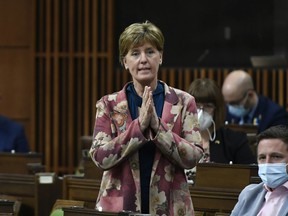
.
Federal Agriculture Minister Marie-Claude Bibeau has moved to counter what she has described as “misinformation”: that the 30 percent target for reducing nitrogenous fertilizer emissions is a mandatory limit on the use of fertilizers. She has clarified that it is a voluntary, albeit ambitious, target to reduce emissions from the use of nitrogenous fertilizers between 2020 and 2030. Introduced in the Healthy Environment Healthy Economy plan in December 2020, it is now in its second round of consultations.
Announcement 2
.
The agriculture ministers and premiers of Alberta, Saskatchewan, and Manitoba, as well as many farmers and farm organizations, oppose the goal, despite their broad support and actions to reduce emissions reductions and use nitrogen fertilizers ever more efficiently. .
Why all the fuss then?
Firstly, there is concern that in practice this emissions target will become a binding limit on fertilizer use. Another is that farmers feel insulted that the federal government doesn’t trust them to know how to feed the world sustainably. And there are other concerns and questions about the goal itself, some of which the federal government acknowledged in the August discussion paper on reducing fertilizer emissions.
Announcement 3
.
Provincial agriculture ministers were pleased that the federal minister agreed to add fertilizer emissions to the agenda of the recent federal-provincial meeting. But despite agreement on how to reduce emissions and help farmers make improvements, the provinces were disappointed that the goal itself was not up for debate.
The goal has become a kind of goal. There are concerns about whether it is possible to meet given there are seven growing seasons to go by 2030 or, alternatively, if it is necessary given the cost of fertilizers which has doubled this year. And the 2020 baseline fails to recognize progress from major investments in soil health and fertilizer efficiency while increasing prairie crop production by 70 percent since 2006.
Announcement 4
.
But the biggest concern, the one the minister is trying to address, is the fear that the voluntary target will become a mandatory limit.
Bibeau is reaping what has been sown by his fellow cabinet members, and in particular by the Minister for the Environment and Climate Change. The lack of confidence based on experience in other sectors has carried over to agriculture. Western farmers are well aware of the impacts of changing climate and environmental policies on the energy sector, including moving targets; emission targets that have become proposed mandatory limits for oil sands that become de facto production limits; and the raising of ceilings as targets in other sectors become ceilings.
It should come as no surprise to the minister that her assurances that the federal government “has no intention of making the target mandatory” are taken with a grain of salt. “Unintentionally” is not the same as “I won’t”. The uncertainty remains. That is why the idea of the “contract for difference” has been proposed to create certainty about the future price of carbon. Perhaps the federal government or even the provinces could consider providing security through a guarantee to reimburse any penalties for the use of nitrogenous fertilizers if the target becomes a mandatory limit. This would create the necessary certainty to stimulate investment from farmers, the industry and our international clients.
ad 5
.
What we have here is not just a failure to communicate, but also a failure to truly listen and collaborate.
July’s good work by federal and provincial ministers to sign the Canadian Sustainable Agriculture Partnership agreement to fund emissions reduction activities has been lost in the uproar over federal commitment to a controversial goal. The ministers and ministries of agriculture have a good track record of collaborating, so far. Where that record fails is in collaboration on emission reduction targets despite shared jurisdiction.
It should not be surprising that the Minister of Agriculture is reaping mistrust due to the white that her government planted in the environmental file.
Gary G. Mar is the President and CEO of the Canada West Foundation.

